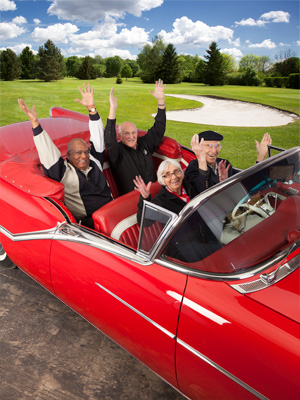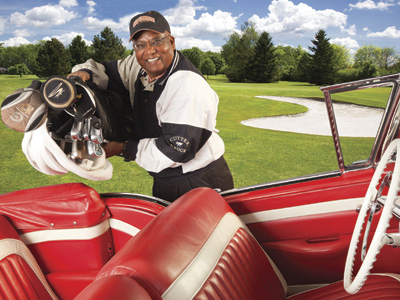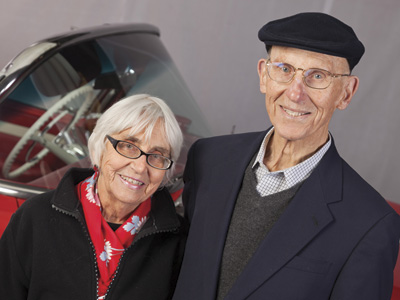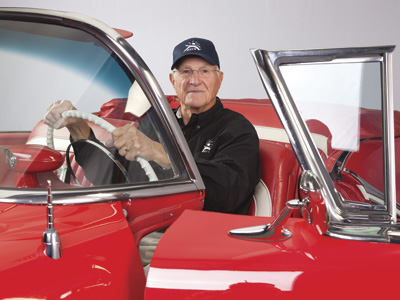 Wisconsin Lawyer
Wisconsin Lawyer
Vol. 84, No. 5, May 2011

While some lawyers may prefer to approach retirement like a 65-mph drive down the interstate, others might choose to meander blue highways. Still, everyone has similar questions about retirement: What’s the process? Can I afford it? How will I fill my time? Jim Martin, Harvey Wendel, and Margo and Joe Melli (pictured), and other lawyers, share their retirement stories in case you’re thinking about shifting gears, too.
Remember when you were a new law school graduate wondering what it would be like to be a “real” lawyer? That may seem like only yesterday. You’ve blinked, and here you are wondering what it will be like to not practice law anymore, or at least be less engaged than you are.
Some 5,600 State Bar of Wisconsin active members currently age 55-plus will be in that position within the next decade or so. They’ll face a transition that stirs many questions: When should I retire? Do I retire altogether, or just cut back my practice? Do I move on to something completely different? Will I be at loose ends? Or will I have the best time of my life?
You won’t know until you try it, of course, much like you couldn’t be sure what to expect when you entered the profession decades ago. No one can tell you how to retire; each lawyer must map out his or her path. Still, hearing a few fellow attorneys’ stories may provide food for thought.
Changing Focus Seven years ago, Micaela Levine and her two partners at Drinka, Levine & Masson S.C. signed a seven-year lease for their Milwaukee office. At the time, Levine told her partners she’d retire in seven years. “I gave them a long heads-up,” she says. “Once I approached my retirement, I had a small panic. But basically I was ready.”
After practicing for 33 years, the last 20 almost exclusively in family law, she wrapped up her practice last winter. “At first I thought I was done with law,” says Levine, now 60. “As I got closer to retiring, I realized I’m not retiring out of law; I’m retiring out of private practice.”
She continues to do family law work at one of the Marquette Law School pro bono clinics where she’s volunteered for years. And she’s pursuing a new interest: providing free legal help to small nonprofit organizations.
It started when she visited a friend who owns a home in Guatemala. A couple of nonprofits there – a literacy project and an animal shelter – were seeking nonprofit status with the U.S. Internal Revenue Service for fundraising purposes. Levine gave them some advice. “So now I’m shifting gears,” she says. “I’ve realized this is a niche where my services are welcome.”
As for the personal side, Levine relishes being free from the time pressures of her former existence. “I was running from morning until I dropped at night,” she says. “Every minute was accounted for.”
She enjoys pursuing personal interests: Pilates, piano lessons, gardening, reading, and cooking. She makes sure to get out every day. As a retiree, “it’s possible to hibernate in your house,” she says. “That’s not good for me.”
Neither, she’s decided, is busy-ness for its own sake. Until retiring, she’d spent her entire life either working or in school. “I’ve never had unstructured time,” she says. “I took some years off when my babies were young [they’re now 23 and 26], but that was even more structured in a way. When I retired, one of my goals was to not fill my calendar with a bunch of stuff I didn’t really want to do just because I was panicking about a lack of structure. I’ve been careful about that.”

Jim Martin first retired in 2002 to Florida, but it wasn’t long before he thought, “Oops, what did I do?” He soon returned to Madison as city attorney and then served as a circuit court judge, finally retiring for good in 2009 at age 65. His bucket list includes golfing in every state; he has 20 more to go.
Jim Martin claims he’s retired for good this time. “I’m on my second tour,” he says. He first retired in February 2002. He’d had a 25-year career at the Madison city attorney’s office that was briefly interrupted in 1998 when he was tagged to serve as an interim administrator for the Board of Attorneys Professional Responsibility (now the Office of Lawyer Regulation). After 20 months, Martin returned to the city attorney’s office for a couple more years before retiring.
At age 57, he was off to Florida. Doubts soon emerged. “I was 1,500 miles from my roots and didn’t have any contacts there in a professional sense,” he says. “I thought, ‘Oops, what did I do?’”
Seven months later he got a call from his old office. Would he consider coming back to become city attorney? It took only a little arm-twisting to spark Martin’s interest. He applied and got the job.
A little over a year later, in 2003, a career dream came true when Gov. Jim Doyle appointed Martin to the Dane County Circuit Court, where he served for five-and-a-half years before retiring in July 2009.
Now, nearly two years later, Martin, 66, admits he occasionally wakes up with thoughts of working part-time. “That feeling usually dissipates by noon,” he says. He has no plans to return to Florida.
Life is full right here. He walks for an hour-and-a-half every morning. He’s devoting a lot of time to his undergraduate alma mater, the University of Dubuque, where he serves on the board of trustees and chaired the search committee to hire a new academic dean last year.
“I have a bucket list that says I’m going to golf in every state in the union,” he says. “I have 20 more to get to.” His love of golf spills over into such activities as The First Tee®, a national program that gives young people a chance to learn to play golf while also gaining life and educational skills. The First Tee is getting started in south-central Wisconsin, and Martin serves on the board.
Having been to the British Isles and China, Martin and his wife are mulling over possibilities for their next travel adventure. And one more idea is beginning to germinate. “I might teach a night course, a law course, at the University of Dubuque,” Martin says. “I’m toying with the idea.”

Margo, 85, and Joe Melli, 87, have “retired,” but only from regular work schedules. Margo retired in 1993 but works at home every day; she’s currently finishing writing a chapter for a book on family law in several countries. Joe stopped practicing law this year but goes to his office every day to advise colleagues and do volunteer work.
Every attorney must plot out his or her own retirement. But as two lawyers who have been married to each other for 61 years, Joe and Margo Melli have had to get their approaches in sync, more or less.
Joe, 87, walks five days a week to stay fit. Margo, 85, swims with equal frequency, or did until a freak accident last fall put that on hold. She fully intends to return to her swimming schedule.
He goes to Melli Law S.C. in downtown Madison every day. For her, “working at home is a pleasure,” she says. “We live on Lake Monona, so I have a picture-postcard view of the Monona Terrace out my window.”
As of late March, she’s under deadline to produce a chapter for a book covering family law in several countries. She’s writing the chapter on U.S. law with the theme, “changing laws for changing families.”
She retired from the U.W. Law School in 1993, where in 1959 she was the first woman hired on the faculty. She continues to serve on the board of the Frank J. Remington Center, home to many of the school’s clinical projects. “I love the law school,” she says. “I haven’t cut the cord.”
Joe stopped practicing law in January 2011, the culmination of a 16-year phase-out. He still goes to his office daily to provide advice to colleagues and do work for the State Bar (he’s wrapping up his term as president of the Senior Lawyers Division) and various civic organizations, such as serving on the boards of the Madison Museum of Contemporary Art and Tandem Press, among others.
Like Margo, Joe relishes his active life now. Yet, ceasing law practice wasn’t easy. “I love the practice of law,” he says. “I miss advising clients and the litigation aspects. I handled a number of arbitrations. I enjoy tremendously getting into the mix on negotiations.”
Looking back on his gradual wind-down approach to retirement, he notes only one thing he might have done differently. “I wonder if I started too early, at 71,” he says. “Have you ever been a jogger? When you quit, you feel kind of let down when you see others jogging and you’re not. It’s the same thing.”

Harvey Wendel, 72, goes to the office every morning but works “not even half-time” and has no set date for full retirement. He can do legal work if he wants to and has more time to coach associates, stay involved in bar associations, and volunteer as a pontoon driver for the Madison School & Community Recreation program.
One day Madison attorney Harvey Wendel saw a notice in the newspaper calling for boat drivers. If you love Madison’s lakes, the notice proclaimed, and know how to drive a boat, become a Madison School & Community Recreation (MSCR) pontoon driver. It caught Wendel’s eye, and being U.S. Coast Guard-certified, he met the qualifications.
Now every summer you’ll find him launching a 30-foot pontoon from the Tenney Park pier to give lake tours. The MSCR pontoons give rides to about 6,000 people, of all ages, every year.
After volunteering for a couple of years, Wendel’s involvement grew. “The next thing I knew,” he says, “I was on the board of the Friends of MSCR, which I’ve been serving on now for about eight years. I became board president last year.” He doesn’t mention it, but he was also named Volunteer of the Year in 2009. The Friends of MSCR raises funds for Madison’s public schools.
Wendel, 72, is right in the thick of what he sees as his mission in retirement. “It’s about giving back,” he says. He’s been practicing law for 48 years, most recently with Murphy Desmond S.C. He goes into the office every morning and works “not even half-time,” he says.
He’s clearly enjoying the extra time he has now, whether it’s for travel, steering pontoons, serving on various boards, or working with the Dane County Bar to garner donations for art for the new county courthouse, among other activities.
He has no specific full-retirement date in mind. “I love the law,” he says, “and the relationships I have with the attorneys in our firm, the Dane County Bar, and the State Bar. I like being involved.”
Murphy Desmond has no required retirement age, a policy set by the example of the firm’s founder, Bob Murphy, who worked at the office until shortly before he died at age 93.
“I’m here to help, to coach associates or whatever,” Wendel says. “I have a client base [in real estate, land use, and construction law]. I don’t have to do the work, but I can if I want to. It’s a wonderful relationship.”
A Phased-in Approach It’s late March, and after three months at his Florida condo G. Lane Ware is preparing for his April 6 migration back to Wausau. He’s had this arrangement for the past several years. While in Sarasota, he spends “at least half my days on the computer,” he says, attending to law firm and civic matters.
Web Extra: Plan Ahead for Retirement
Plan ahead, know yourself, and retire with your eyes wide open, advised presenters at the State Bar PINNACLETM and Senior Lawyers Division seminar “Transition to Retirement from Law Practice.” In this video, available online with the May 2011 Wisconsin Lawyer, at www.wisbar.org/wl, presenters Lane Ware, Harvey Wendel, and Harry Holtz stress transitioning clients to other lawyers and preretirement planning for finances and activities. You also can find this video at YouTube.com/StateBarofWI.
Ware, 72, is in what he calls a “phased-in retirement.” He retired as president of Wausau-based Ruder Ware when he was 60 and left the firm’s board at 62. “This was all planned,” he says. “I began to accept less new business and concentrated on people I’d represented for a number of years. From age 65 and on, I’ve been trimming that down.”
Once back in Wausau, Ware will arrive at the office at around 8 a.m., five days a week. He likes using his office as his base, whether it’s to serve long-time law clients or to work on his or his firm’s civic contributions. In July and August, he does that from his Minocqua cottage.
“I see a time coming in the not-too-distant-future when the bulk of my activities will be of the civic/community nature,” he says. He continues to be active in the local Performing Arts Foundation, Chamber of Commerce, and Marathon County Economic Development Council, among other civic groups, as well as in the State Bar.
What Ware likes best is the flexibility he has now. “I can tailor what I do,” he says. “I can balance family, career, and personal life.” Whereas before, for instance, he had to squeeze in civic-related responsibilities and dash back to work, “now I can say, ‘I can work on that all afternoon. What do you need? How can I help?’”
Older lawyers can learn much from younger ones, Ware adds, about life balance. “For us, it was, by George, get to the office, get this done, and work like a dog,” he says. “Younger lawyers do a much better job of balancing work and life. It’s a big improvement.”
What’s the toughest part of his phased-in retirement process? “Letting go,” he says. “I have a diminished role with clients I have served for many years. They continue on with other partners.”
New Beginnings The event that triggered former Milwaukee attorney Pat Ballman’s retirement was a bit unusual: She got married. “We had a long-distance romance [between Milwaukee and Chicago] for 10 years,” she says, “until we finally figured out I needed to retire and move to Chicago.” Her husband is fellow Quarles & Brady LLP attorney Tom Polachek.
Ballman took early retirement a couple of years ahead of the firm’s mandatory retirement age of 65. As the only one in the Milwaukee office practicing family law, she couldn’t transition clients to anyone within the firm. She gradually wound down her practice by taking no new clients over about a year-long period.
Now that she’s settled in Chicago, she’s decided not to pursue a license to practice in Illinois, but is maintaining her Wisconsin license. She’s building her practice as a mediator and expert witness in family law matters, working in Wisconsin only.

Curious about the car?
According to Justin Cole, president of Benchmark Classics in Madison, you can find a ‘57 Chevy almost anywhere, but a ‘57 Olds 98 convertible?
“With only about 8,000 made, this convertible was uncommon in its day. There’s just a handful left today in anywhere near this condition.” And, this beauty is tricked out with one of the most potent of the legendary Rocket V-8s, the J2 Tri-Power 371/300 horsepower engine.
The Wisconsin Lawyer thanks Benchmark Classics for the use of the car.
After 32 years, giving up law practice hasn’t been difficult for Ballman. What has been challenging is moving to a new city and starting over to make new friends, other than her husband. “That is the slow part,” she says. “I thought it would be easier.”
She’s gradually making inroads in her new hometown. She’s volunteering at Children’s Memorial Hospital, fulfilling a duty she loves. “I hold babies,” she says, “from newborns to toddlers. My grandchildren [she has two, ages 3 and 17] are too far away or too big to hold anymore.”
Ballman also is seeking pro bono opportunities she can engage in without an Illinois law license. She’ll attend the Chicago Bar Association’s volunteer fair to explore the possibilities.
Her mediator and expert witness work, which she hopes to expand, also is intellectually stimulating. “It’s so different from representing a party,” she says, “because you don’t fight. You help people reach a resolution, and that is very satisfying.”
She’s enjoying numerous other perks of the semi-retired life, too. “This afternoon, Tom and I are going to lunch and then to the symphony,” she says. “Can you imagine going to the symphony on a Friday afternoon?”
On Call If you call the Milwaukee NAACP office on a Thursday, you’re likely to hear Barbara Becker answer the phone. She’s there every Thursday fielding calls and taking discrimination complaints, plus one night a week for steering committee meetings and on Saturdays for other committee meetings.
Becker, 70, also is a literacy tutor one night a week. And every Wednesday she sees clients at Becker, Hickey & Poster S.C., where she handles elder law cases. “I’m always bringing work home,” she says. “I’ve also given my home phone number to clients because sometimes they can’t wait.” All told, she figures she works about 30 hours a month on client matters. She’s also active on the State Bar’s Elder Law
Section board.
Add to that the fact she’s the sole caregiver for her 88-year-old husband who has health issues. Becker readily admits she could use more downtime – time, for instance, to just sit with her husband and do crosswords.
As for her retirement planning, “I had a 10-year plan with my firm,” she says. But the target kept moving. A couple years would pass, and retirement would still be 10 years out. Finally, she set a date and retired from full-time practice in January 2008.
“You make a plan,” Becker says, “and then you alter it to fit your circumstances. Life happens.” That included things like her husband’s health issues and a stock market crash after which extra part-time income came in handy.
At some point, Becker intends to exit her law practice completely. Then, as now, volunteer work will be a vital part of her life. “There’s so much to do in this community,” she says. “Recently, there was another article published about the 50 most segregated U.S. cities. Milwaukee was at the top of the list. The unemployment rate among black males is about 60 percent.”
Such problems move Becker to contemplate taking on one more volunteer gig: financial literacy training. “A lot of African-American high school graduates don’t know how to read and manage their finances,” she says. “So I think adult education is extremely important.”
Transition to Retirement from Law Practice seminar available On Demand
In the Transition to Retirement from Law Practice seminar, coproduced by State Bar PINNACLETM and the Senior Lawyers Division, presenters cover all the important issues, from preretirement planning to maintaining a relationship with your firm, including the nuts and bolts of exiting a practice and how to manage the financial and legal aspects of retirement.
If you missed the full-day live program (March 24) and webcast replay (April 20), you can access the seminar through PINNACLETM On Demand. State Bar member cost is $199; free to Ultimate Passholders. 8.0 CLE and 0.0 EPR credits. For more information or to purchase, please visit www.wisbar.org/pinnacle.
At 71, Gary Bakke has a living situation uncommon to most men his age. Besides having two grown daughters who are on their own, he has two sons – one in high school, the other attending vocational school – who live at home.
Hence, Bakke’s weekday morning routine hasn’t changed. “I show up at the office at 7:30 a.m.,” he says, “after I give my son a ride to school. I’m here pretty much every day and leave when I feel like it. That depends a lot on the weather.”
On one recent afternoon, for instance, biking conditions were excellent, so Bakke took off on a 30-mile ride. He started serious biking at age 65 and now rides at least 5,000 miles a year.
He sold his shareholder interest in New Richmond-based Bakke Norman S.C. not long after completing his term as State Bar president in 2001. He’s since been an employee of the firm. “I try to not have clients of my own so I don’t have to stay around and be on the front line,” he says.
Still, the office connection remains important to Bakke. “This is my social network,” he says. “It’s a good base from which to do other things, too, such as pro bono work. My wife is the accountant here, and her office is two feet from my door. It’s kind of a family operation.”
Bakke enjoys continuing to work on legal matters, as he chooses, while scaling back. “I have more time for absolutely everything,” he says. “I can cook, I have more time for family. I think I’m healthier because of the lack of stress. I sleep better, eat better, exercise more.”
He also takes on carpentry projects, such as home remodeling projects for friends, a venture he began to give his oldest son a taste of the working world. “We don’t have a project going right now,” he says. “But when the next one shows up, we’ll take it.”
Still, Bakke recognizes a bittersweet aspect to retiring, or partially retiring. Many attorneys can empathize. “I’m here seeing how the firm runs on a day-to-day basis,” he says, “so sometimes there’s some frustration about something I would have done differently. Now, that’s a two-sided coin. The other side is I don’t have to worry about how people get paid. But I’ve always thought of this as my firm. It was my baby.”
Dianne Molvig is a frequent contributor to area and national publications. Photos: Andy Manis
Wisconsin Lawyer
